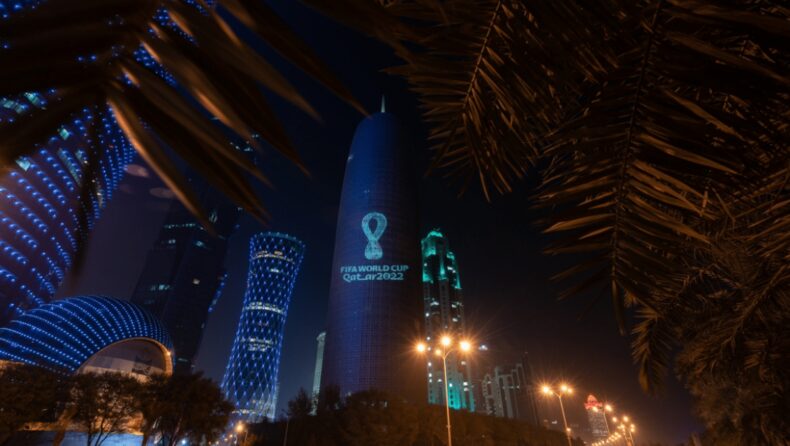Paris has decided against broadcasting Qatar World Cup matches on giant screens in public fan zones amid concerns over rights violations of migrant workers and the environmental impact of the tournament in Qatar.
In response to worries over the treatment of migrant workers’ rights and the effects of the tournament in Qatar on the environment, Paris will not show World Cup games on massive screens in public fan zones.
Despite being the defending champion, France made similar steps in other French cities. Other European organisations are also considering how they may protest.
According to Pierre Rabadan, the deputy mayor of Paris in charge of sports, the decision to forgo public broadcasting of games was made because of “the conditions of the administration of this World Cup, both on an environmental and social level.”
In an interview with France Blue Paris, he claimed that “air-conditioned stadiums” and the “conditions in which these facilities have been developed ought to be questioned.”
Even while Paris, the host of the 2024 Olympics, insisted that it is not boycotting the soccer tournament, Rabadan said that Qatar’s “style of holding huge events goes against what (Paris) wishes to arrange.”
Despite Qatar Sports Investments’ owning the city’s football team, Paris Saint-Germain, the decision was made.
“We have excellent relationships with the club and its support staff, but it doesn’t stop us from voicing our disagreements”, according to Rabadan.
Denmark will wear black World Cup jerseys in remembrance of migrant workers who lost their lives while working on tournament construction as part of its own protest. In an effort to combat discrimination, a number of European soccer federations want their captains to wear an armband with a rainbow heart pattern during World Cup matches.
To protest Qatar’s human rights record, an increasing number of French cities are refusing to construct screens to show World Cup games.
Public broadcasts of the World Cup were cancelled due to claims of human rights violations and the exploitation of migrant workers in Qatar, according to the mayor of Strasbourg, which also serves as the location of the European Parliament and the European Court of Human Rights.

Jeanne Barseghian stated in a statement that “it is hard for us to disregard the countless warnings of abuse and exploitation of migrant labour by non-governmental groups.” “We cannot support these wrongdoings, and when human rights are infringed, we cannot remain silent.” Barseghian added that there is also an effect on the ecosystem.
“Organizing a soccer tournament in the desert defies common sense and amounts to an ecological calamity“, she added. “Climate change is a palpable reality, with fires and droughts and other
Lille’s deputy mayor, Arnaud Deslandes, claimed that by forbidding spectators from watching games, the northern city hoped to convey to FIFA the irreparable environmental harm caused by the tournament in Qatar.
Deslandes stated in an interview with The Associated Press, “We want to show FIFA that money is not everything.
He continued, “I have yet to encounter a Lille citizen who was disappointed by our decision,” in reference to how the city’s decision was received by the populace.
The gas-rich emirate has come under heavy fire in recent years for how it has treated migrant workers, primarily from South Asia, who were required to construct stadiums, metro lines, highways, and hotels costing tens of billions of dollars.
Both allegations of human rights violations and the alleged threat to the safety and health of the 30,000 workers who constructed the World Cup’s infrastructure have been fiercely refuted by Qatar.
Qatar has also stated that it is conscious of environmental issues and has promised to offset part of the carbon emissions from the World Cup games by constructing alternative energy projects and creating new green spaces that will be irrigated with recycled water.
Because watching the tournament outside from November 20–December 19 would use energy that the nation has been storing for the winter, environmental groups across France have backed the decision to cancel public broadcasting in fan zones.
Authorities in Bordeaux, a city in the southwest, expressed worries about the energy costs incurred by outdoor public broadcasts during the chilly winter months. In light of tensions with supplier Russia over the conflict in Ukraine, the French government is urging a drastic 10% drop in the nation’s energy use in order to prevent the possibility of rationing this winter.
Bordeaux mayor Pierre Hurmic told the AP, “We are making every effort to conserve energy”.
“Rolling out the red carpet for such an expensive event in terms of energy and the environmental impact doesn’t make sense,” he continued.
Read More: FIFA WORLD CUP FOOTBALL













